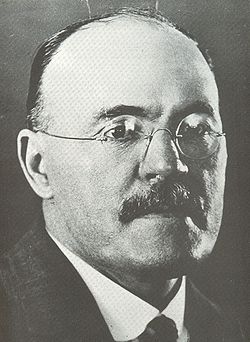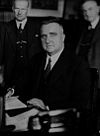
Lang Dismissal Crisis
Encyclopedia


New South Wales
New South Wales is a state of :Australia, located in the east of the country. It is bordered by Queensland, Victoria and South Australia to the north, south and west respectively. To the east, the state is bordered by the Tasman Sea, which forms part of the Pacific Ocean. New South Wales...
Governor Philip Game
Philip Game
Air Vice-Marshal Sir Philip Woolcott Game GCB, GCVO, GBE, KCMG, DSO was a British Royal Air Force commander, who later served as Governor of New South Wales and Commissioner of Police of the Metropolis...
was the first real constitutional crisis in Australia
Australia
Australia , officially the Commonwealth of Australia, is a country in the Southern Hemisphere comprising the mainland of the Australian continent, the island of Tasmania, and numerous smaller islands in the Indian and Pacific Oceans. It is the world's sixth-largest country by total area...
. Lang remains the only Australian Premier to be removed from office by his Governor, using the Reserve Powers
Reserve power
In a parliamentary or semi-presidential system of government, a reserve power is a power that may be exercised by the head of state without the approval of another branch of the government. Unlike a presidential system of government, the head of state is generally constrained by the cabinet or the...
of the Crown
The Crown
The Crown is a corporation sole that in the Commonwealth realms and any provincial or state sub-divisions thereof represents the legal embodiment of governance, whether executive, legislative, or judicial...
.
Early in 1931 Jack Lang
Jack Lang (Australian politician)
John Thomas Lang , usually referred to as J.T. Lang during his career, and familiarly known as "Jack" and nicknamed "The Big Fella" was an Australian politician who was Premier of New South Wales for two terms...
released his own plan to combat the Depression; this became known as "the Lang Plan". This was in contrast to the "Melbourne Agreement" which all other State Governments and the Federal Government had agreed to in 1930. Lang believed that the Depression was essentially caused by overseas bankers who were greedy for even more money and that this deflationary plan would only secure their wealth.
Key points of the Lang Plan included the reduction of interest owed by Australian Governments on debts within Australia to 3%, the cancellation of interest payments to overseas bondholders and financiers on government borrowings, the injection of more funds into the nation's money supply as central bank credit for the revitalisation of industry and commerce, and the abolition of the Gold Standard
Gold standard
The gold standard is a monetary system in which the standard economic unit of account is a fixed mass of gold. There are distinct kinds of gold standard...
, to be replaced by a "Goods Standard," whereby the amount of currency in circulation would be fixed to the amount of goods produced within the Australian economy. The banks had indicated that if he paid the interest they would advance him an additional amount which was greater than the interest, thus giving him a positive cash flow.
Lang was violently opposed to the Premiers' Plan agreed to by the federal Labor government of James Scullin
James Scullin
James Henry Scullin , Australian Labor politician and the ninth Prime Minister of Australia. Two days after he was sworn in as Prime Minister, the Wall Street Crash of 1929 occurred, marking the beginning of the Great Depression and subsequent Great Depression in Australia.-Early life:Scullin was...
and all the other premiers, which called for even more stringent cuts to government spending to balance the budget. In October 1931 Lang's followers in the Australian House of Representatives
Australian House of Representatives
The House of Representatives is one of the two houses of the Parliament of Australia; it is the lower house; the upper house is the Senate. Members of Parliament serve for terms of approximately three years....
crossed the floor to vote with the conservative United Australia Party
United Australia Party
The United Australia Party was an Australian political party that was founded in 1931 and dissolved in 1945. It was the political successor to the Nationalist Party of Australia and predecessor to the Liberal Party of Australia...
(UAP) and bring down the Scullin government. This action split the NSW Labor Party in two - Lang's followers became known as Lang Labor, while Scullin's supporters, led by Chifley, became known in NSW as Federal Labor. Most of the party's branches and affiliated trade unions supported Lang.
When the United Australia Party Government
Government of Australia
The Commonwealth of Australia is a federal constitutional monarchy under a parliamentary democracy. The Commonwealth of Australia was formed in 1901 as a result of an agreement among six self-governing British colonies, which became the six states...
of Joseph Lyons
Joseph Lyons
Joseph Aloysius Lyons, CH was an Australian politician. He was Labor Premier of Tasmania from 1923 to 1928 and a Minister in the James Scullin government from 1929 until his resignation from the Labor Party in March 1931...
came to power in January 1932, it passed the Financial Agreement Enforcement Act, thereby forcing the NSW government to adhere to its debt commitments and to cut government spending. In response, Lang withdrew all the state's funds from government bank accounts so that the federal government could not gain access to the money. Game advised Lang that in his view this action was illegal, and that if Lang did not reverse it he would dismiss the government. Lang stood firm, and issued a leaflet in defiance of Game. Game then reluctantly decided to exercise his reserve powers and called Lang to Government House
Government House, Sydney
Government House is located in Sydney, Australia alongside the Royal Botanic Gardens, overlooking Sydney Harbour, just south of the Sydney Opera House...
to dismiss him. However, Lang was not the first to hear of his dismissal. The pianist Isador Goodman
Isador Goodman
Isador Goodman AM was a South African-Australian Jewish pianist, composer and conductor. He became a household name in Australia in the 1930s-1970s, taught at the New South Wales Conservatorium of Music for 50 years, introduced many Australians to classical music, and contributed hugely to music...
, who had been befriended by Sir Philip and Lady Game, was at Government House for dinner that night. There were a number of interruptions, and Goodman asked if he perhaps ought to leave. Game replied "No, that's not necessary, you see, I am about to dismiss the Premier".
Gerald Stone, in his book 1932, states that there is evidence that Lang considered arresting the Governor to prevent the Governor from dismissing him. The possibility of this was sufficiently high that the armed forces of the Commonwealth, who would have come to the assistance of the Governor, were put on alert.
On 13 May 1932 Game dismissed Lang's government and appointed the UAP leader, Bertram Stevens, as Premier. Stevens formed a Coalition with Michael Bruxner
Michael Bruxner
Lieutenant Colonel Sir Michael Frederick Bruxner KBE, DSO, JP was an Australian politician and soldier, serving for many years as Leader of the Country Party and its predecessors...
's Country Party and immediately called an election
New South Wales state election, 1932
The 1932 New South Wales state election was held on 11 June 1932. This election was for all of the 90 seats in the 30th New South Wales Legislative Assembly and it was conducted in single member constituencies with compulsory preferential voting...
, at which Lang's NSW Labor Party was heavily defeated. This was the first case of an Australian government with the confidence of the lower house of Parliament being dismissed by a Vice-Regal representative, the second case being when Governor-General Sir John Kerr dismissed
Australian constitutional crisis of 1975
The 1975 Australian constitutional crisis has been described as the greatest political crisis and constitutional crisis in Australia's history. It culminated on 11 November 1975 with the removal of the Prime Minister, Gough Whitlam of the Australian Labor Party , by Governor-General Sir John Kerr...
Gough Whitlam
Gough Whitlam
Edward Gough Whitlam, AC, QC , known as Gough Whitlam , served as the 21st Prime Minister of Australia. Whitlam led the Australian Labor Party to power at the 1972 election and retained government at the 1974 election, before being dismissed by Governor-General Sir John Kerr at the climax of the...
's government on 11 November 1975. Game himself felt his decision was the right one, despite his personal liking of Lang. He wrote to his mother-in-law on 2 July 1932: "Still with all his faults of omission and commission I had and still have a personal liking for Lang and a great deal of sympathy for his ideals and I did not at all relish being forced to dismiss him. But I felt faced with the alternative of doing so or reducing the job of Governor all over the Empire to a farce." Lang himself, despite objecting to his dismissal conceded that he too liked Game, regarding him as fair and polite, and having had good relations with him.

